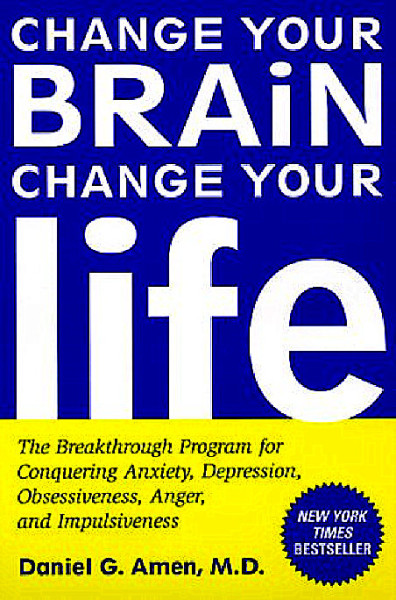Let’s Talk!
In 2014, I read an intriguing book by American psychiatrist Dr. Daniel G. Amen titled Change Your Brain, Change Your Life. This bestseller offers a breakthrough program to improve brain function and conquer mental illnesses such as anxiety, depression, and obsessiveness. In 2011, Amen gave a TED talk by the same title. The following is a summary of his presentation.
The brain is the most complex organ in the universe. It is only 2% of the human body’s weight, yet consumes 20-30% of the calories we consume daily. The adult brain contains on average 100 billion nerve cells, and each nerve cell can be connected to 10,000 other nerve cells. The information travels at 268 miles/hour, and we lose an average of 85,000 nerve cells per day.

 The brain is involved in all our activities; from the way we think, feel, and act to how we interact with others. When the brain functions well, we thrive. Conversely, when the brain malfunctions, we usually struggle. We can accelerate brain aging with unhealthy behaviours or we can decelerate it with a healthier lifestyle.
The brain is involved in all our activities; from the way we think, feel, and act to how we interact with others. When the brain functions well, we thrive. Conversely, when the brain malfunctions, we usually struggle. We can accelerate brain aging with unhealthy behaviours or we can decelerate it with a healthier lifestyle.
Amen uses Single Photon Emission Computed Tomography (SPECT) to see how the brain works. SPECT is a very sophisticated imaging study that enables him to look at brain blood flow and activity patterns. These brain scans show areas of normal function, areas of low activity, and areas of high activity. The goal is to have a balanced activity level throughout the brain.
A healthy brain has full symmetrical activity. The colour of the scan is irrelevant, it’s the shape that counts (see the pictures below). By contrast, the scan on the right is that of an alcoholic individual.
A healthy brain enables a person to be happier, healthier, richer, wiser, more creative, and more innovative. An unhealthy brain usually leads to a sadder, sicker, poorer, less intelligent, rigid, and inflexible person.
Many diseases, poor lifestyle choices, and environmental factors can damage the brain. For example, brain injuries, drugs, alcohol, obesity, smoking, high blood pressure, diabetes, the Standard American Diet (SAD), environmental toxins, lack of exercise, and automatic negative thoughts (ANTS) can have a negative effect on the brain.
Let’s examine how some of these factors impact the brain.
The brain is a very soft organ protected by a thick, hard skull with many sharp bony ridges. Repetitive blows to the brain thrust this delicate organ against these sharp ridges and may cause irreparable damage. Contact sports such as American football are very injurious to the brain and should be avoided.
Alcohol is toxic to the brain, even in small amounts. Contrary to popular belief, drinking as little as 2 glasses of wine per day has a negative effect on the brain.
North America is facing an obesity crisis. Excess weight often leads to diseases such as heart attacks and diabetes, but also negatively affects the brain. There are 10 published studies on obesity that suggest that as body weight increases, the physical size and function of the brain decrease.
It is a well-known fact that cigarette smoking may lead to lung cancer. But smoking also constricts blood flow to the brain and thereby the nourishment of neurons. The same can be said for high blood pressure as it also reduces blood supply to the brain.
The SAD consists of highly processed foods high in refined sugar and salt, but low in fresh vegetables, fruits, fiber, and healthful fats. This diet has been linked to diseases such as cancer, diabetes, depression, Alzheimer’s disease, and poor brain health.
How can we improve the health of our brains?
Sleep is essential. We need 7 hours of sleep each night in order to have proper blood flow to the brain. As sleep decreases, weight usually increases because people tend to crave processed food.
Meditation increases blood flow to the brain and activates the prefrontal lobes. The prefrontal lobes are the CEO of the brain and help us make wiser decisions.
Interestingly, being slightly anxious can be beneficial to health; it helps us make positive changes to prevent many diseases.
Monitor your thoughts. Don’t believe every negative thought that you have because the vast majority of ANTS are false.
If a person is suffering from depression, one of the best anti-depressants is gratitude. Every day, write 3 things that you are grateful for, and within 3 weeks you will view life in a more positive light.
Be a lifelong learner. Learning stimulates new neural connections and the brain becomes more efficient at accomplishing the same tasks.
It is also recommended to nourish positive social connections. Positive interactions increase longevity, and we tend to emulate the health-enhancing habits of others.
The brain is the most complex organ in our body. It is involved in every activity that we perform on a daily basis. In order to be at our best, we need a well-functioning brain.
In the past 20 years, psychiatrist Dr. Daniel G. Amen has looked at thousands of SPECT brain scans and has identified factors that are detrimental versus beneficial to the brain.
Amen recommends avoiding factors such as contact sports, alcohol, smoking, and SAD. Conversely, he suggests having a healthy diet, enough sleep, a positive outlook on life, and supportive relationships.
Whoever we are, it’s always an auspicious time to explore how changing our brains can change many areas of our life.
Literary Truths
Here are other interesting facts as per Dr. Daniel G. Amen’s talk:
- From 1991 to 2011, Dr. Amen’s clinics have performed 63, 000 brain scans – the greatest total number of scans ever performed.
- By making positive lifestyle changes, it’s possible to improve brain function within 2 months.
- The brain stops developing between the ages of 25 to 28. Therefore, children, teenagers, and young adults should avoid activities (i.e., tackle football) that might injure their developing brains.
- The incidence of Alzheimer’s disease may triple in the next 25 years. The way to reduce the incidence of this disease is to decrease the diseases associated with it such as heart disease, cancer, diabetes, depression, and high blood pressure.
- There are 3 studies in the journal Lancet that have shown that if children have a healthier diet for only 3 months, 73% of them show a greater than 50% reduction in their attentional and behavioural problems.
Truth in Motion
References
Change Your Brain, Change Your Life: https://www.youtube.com/watch?v=MLKj1puoWCg
Picture 1: https://www.amazon.ca/Change-Your-Brain-Life-Obsessiveness/dp/0812929985
Picture 2: https://twitter.com/docamen
Picture 3: https://www.youtube.com/watch?v=MLKj1puoWCg


